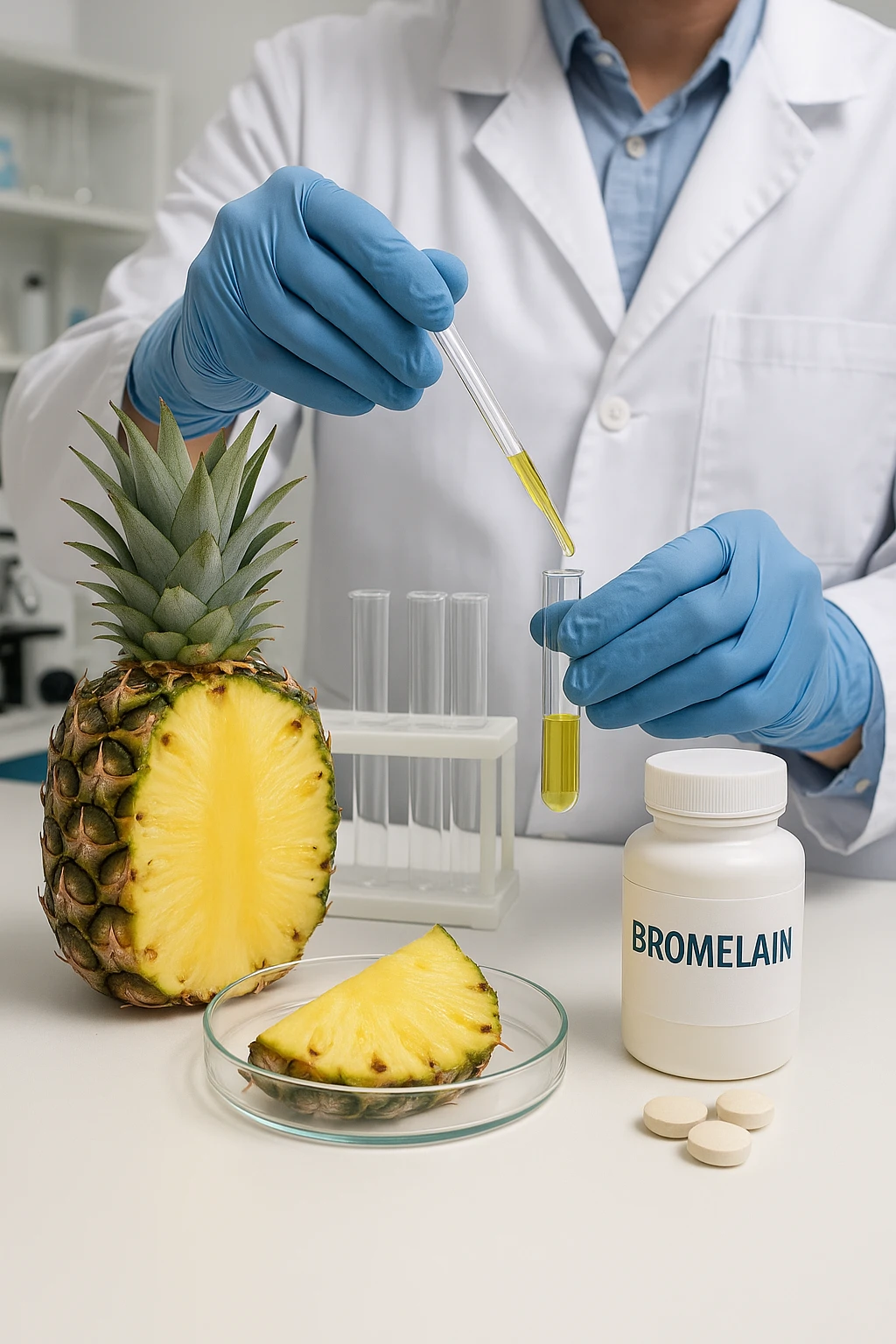

Bromelain, an enzyme complex derived primarily from pineapples (Ananas comosus), is widely recognized for its ability to improve digestion and reduce inflammation.
The popularity of this enzyme as a nutraceutical and therapeutic agent has increased due to its natural origin and scientifically proven efficacy.
What is bromelain?
Bromelain is a complex of proteolytic enzymes that can break down proteins.
It is found in pineapples, with the highest concentration found in the stem and fruit. The main components of bromelain are cysteine proteases, which have a significant effect on human protein metabolism.

Effect of bromelain on digestion
Bromelain helps digestion by breaking down proteins into amino acids that are better absorbed by the body.
Studies show that it can significantly reduce the discomfort associated with heaviness and bloating after eating protein-rich foods [1].
Table 1 Main digestive benefits of bromelain
| Advantages | Mechanism of action |
|---|---|
| Improved protein digestion | Proteolytic activity |
| Reduction of bloating and gas formation | Facilitates the breakdown of heavy proteins |
| Improved bowel function | Reduces inflammation of the mucous membrane |
Anti-inflammatory effect of bromelain
In addition to its positive effect on digestion, bromelain also has a strong anti-inflammatory effect. It reduces the levels of pro-inflammatory cytokines and suppresses the formation of inflammatory mediators such as prostaglandins [2].
This makes it potentially useful in the treatment of chronic inflammatory conditions, including arthritis, dermatitis, and even postoperative edema.

Use of bromelain in dermatology
In dermatology, bromelain is actively used to reduce swelling, accelerate wound healing, and in the therapy of various skin diseases such as eczema and psoriasis.
It has been found that bromelain can effectively reduce the manifestations of inflammation and itching, which is supported by clinical studies [3].
Table 2 Use of bromelain in dermatological practice
| Diseases | Effects of bromelain application |
| Eczema | Reduction of inflammation and itching |
| Psoriasis | Improvement of skin condition, reduction of redness |
| Postoperative wounds | Acceleration of tissue regeneration, reduction of edema |
Contraindications and side effects
Despite the obvious benefits, there are certain caveats to using bromelain. People allergic to pineapple should avoid its use. Possible effects on blood coagulation should also be considered, especially in patients taking anticoagulants [4].
Conclusion
Bromelain is a promising enzyme that has significant benefits for the digestive system and a pronounced anti-inflammatory effect. Its use in dermatological practice is confirmed by numerous studies, which opens new possibilities for effective treatment and prevention of skin diseases.
List of references
- Maurer HR. Bromelain: biochemistry, pharmacology and medical use. Cell Mol Life Sci. 2001;58(9):1234-1245.
- Hale LP, Greer PK, Trinh CT, Gottfried MR. Treatment with oral bromelain decreases colonic inflammation in the IL-10-deficient murine model of inflammatory bowel disease. Clin Immunol. 2005;116(2):135-142.
- Rathnavelu V, Alitheen NB, Sohila S, Kanagesan S, Ramesh R. Potential role of bromelain in clinical and therapeutic applications. Biomed Rep. 2016;5(3):283-288.
- Kelly GS. Bromelain: A literature review and discussion of its therapeutic applications. Altern Med Rev. 1996;1(4):243-257.



